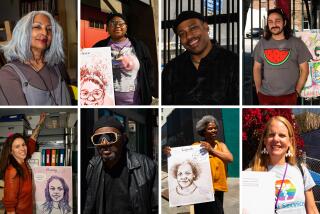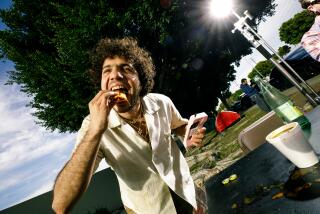Ernest Lieblich dies at 94; pioneer of office coffee service was philanthropist for the arts
- Share via
Ernest Lieblich, a businessman and philanthropist with a passion for the arts who financed the painstaking restoration of a valuable 1930s-era mural and helped uncover the true identity of one of its creators, died April 4 at his Los Feliz home. He was 94.
He died of natural causes, according to his executor, Ariane David.
Lieblich was the founder and president of FoodCraft, a company that provides commercial coffee and snack service throughout Los Angeles and Orange counties. The successful venture, which he had run with his wife, Caryl, since 1967, enabled him to become a generous supporter of the Norton Simon Museum and the Coburn School as well as other arts and music education programs.
One of his most notable efforts was the recovery of a faded floor-to-ceiling mural at the City of Hope medical center in Duarte. The experts he assembled to restore the mural by Reuben Kadish and Phillip Goldstein found that Goldstein was actually Philip Guston, a leading Abstract Expressionist painter who achieved prominence after leaving Los Angeles for New York in the late 1930s.
The mural, painted in 1935-36, depicts 30 draped and nude figures representing vigorous youth to frail old age. Although cracked and grimy from decades of neglect, its beauty made Lieblich gasp when he saw it for the first time in 1996.
“He used his famous word, which was ‘Fabulous!’ ” recalled Robert J. Reid, who was then City of Hope’s vice president for donor relations. “He said, ‘We must do something about this.’ ”
Lieblich was so buoyed by the discovery of a forgotten piece of local art history that he agreed to finance the renovation of the entire Spanish revival building that housed the mural and is now a visitors center. He also conceived a sculpture garden next to the center and filled it with the works of artists such as Charles Arnoldi, Robert Brady, Seiji Kunishima, Michael Todd, Guy Dill, Gwynn Murrill and Peter Reginato.
“I believe that art heals,” Lieblich told Inside Philanthropy magazine a few years ago.
Born in Germany on June 12, 1914, Lieblich, who was Jewish, was trained as a cantor by his grandfather. When the Nazis came to power in the 1930s, he fled to Portugal, where he was jailed for two years for being an illegal immigrant. To pass the time, he sang opera from morning to night in his jail cell. “He said the acoustics were very good in there,” said George Pao, a friend and neighbor for 17 years.
When he was released from prison, Lieblich pursued a singing career in Italy. He stayed in Italy for five years, until dictator Benito Mussolini allied with the Nazis. Lieblich returned to Portugal, where he resumed singing opera.
He arrived in the United States as the nation was preparing to join World War II. After working odd jobs, including a stint as a singing waiter at a Jewish resort, he was drafted into the Army and was trained as a combat engineer.
He was about to be shipped overseas when his musical abilities led to his reassignment to a stateside post. He spent the war years playing the organ and conducting an Army choir at the Western Defense Command, which operated out of the old Huntington Hotel in Pasadena. He later learned that the ship he had almost boarded at the outset of his service was sunk in battle. “He used to say this all the time: His life was literally saved by music,” David said.
After the war, Lieblich remained in California and became a top salesman for Encyclopedia Britannica in Los Angeles.
It was not until the late 1960s that he came across a new kind of drip coffee maker that gave him an idea: He decided to create a service providing office workers with gourmet coffee and refreshments.
It was a pioneering enterprise. According to the National Automatic Merchandising Assn., a national trade group that includes the vending and coffee service industries, the term “office coffee service” was introduced in 1968, the year after Lieblich started FoodCraft.
Notoriously frugal, Lieblich prowled ethnic markets for cheap produce and wore second-hand tennis shoes for his daily hikes in Griffith Park. “He did not spend a lot of money on himself,” Pao said, “but he had no problem giving to charity, provided it was going to the right people.” He was especially committed to helping organizations involving children and the arts, such as the Harmony Project, which brings music education to inner-city schools.
Some of his interventions were more ad-hoc. In 1990 he was moved by the story of a Los Angeles man of modest means who fed the homeless on skid row from a truck until the truck was stolen. A radio station bought the man a new truck. Lieblich offered to buy the man a $4,000 camper shell so that he could sleep in his truck. Then the businessman-philanthropist threw in a free supply of top-grade coffee because, he said, “as long as the homeless are going to drink coffee, it might as well be good stuff.”
Lieblich is survived by his wife, two daughters and a grandson.
A celebration of his life is planned for 2 p.m. June 7 at the City of Hope sculpture garden.
More to Read
Start your day right
Sign up for Essential California for the L.A. Times biggest news, features and recommendations in your inbox six days a week.
You may occasionally receive promotional content from the Los Angeles Times.







